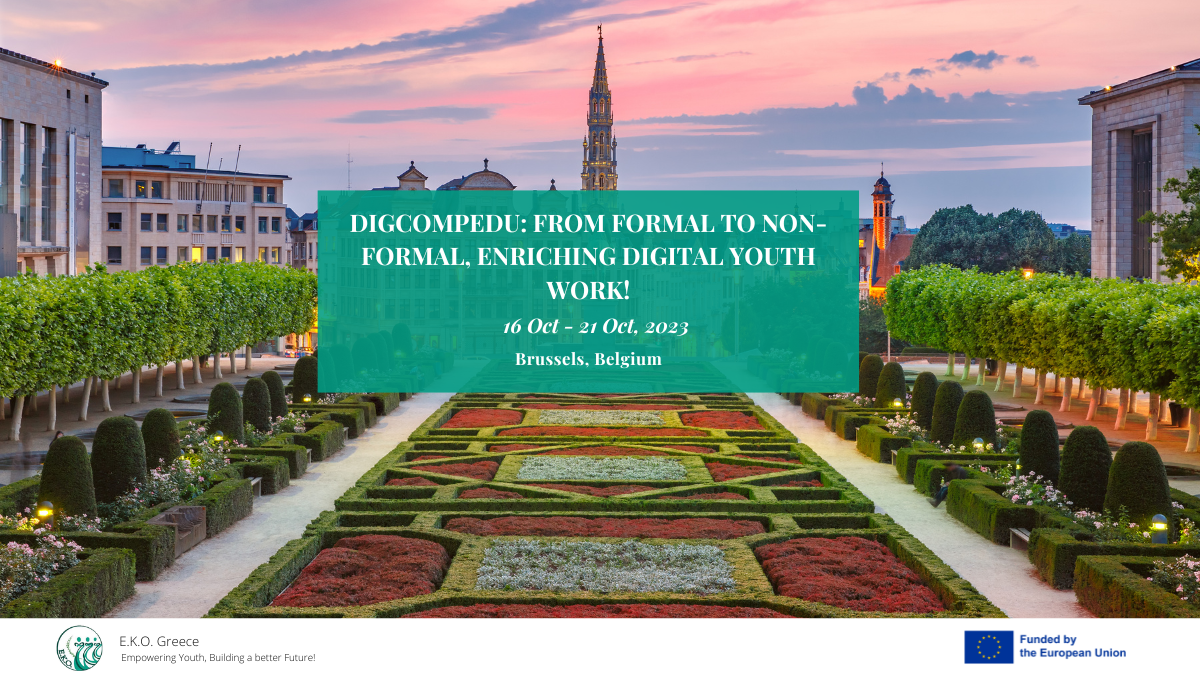
DigCompEdu: from formal to non-formal, enriching digital youth work!
Training Course, 16 – 21 October 2022

EKO is happy to announce that one more awesome training course has been successfully completed. The project took place in Brussels, Belgium. In this project 25 youth workers from different countries gathered to learn about the DigCompEdu framework and improve their digital skills. The project was implemented from 16th of October till 21th of October 2022 by the host organization YouthProAktiv and participants from 8 more countries including: Belgium, Spain, Greece, Georgia, North Macedonia, Albania, Slovenia and Spain. The training based on non-formal education activities was planned in order to meet the needs faced by youth workers through new technologies and digital ways that are really useful in today’s society we live in. Youth workers need to adapt to new digital methodologies, using powerful tools and sources as well as be ready to boost the digital aspect of their daily work practices.
The main objectives of the project:
– Increasing the digital competencies of youth workers ensuring better professionalization and motivation of their work.
– Increase youth workers’ understanding of the Digital Competence for Educators and how it may be used and exploited in a non-formal learning context.
– Improve youth worker’s professional competencies to create & share digital resources.
– Enhance youth workers’ digital learning & teaching non-formal methodologies and evaluate their non-formal teaching impact and their specific target groups’ learning processes.
– To promote non-formal education and its methods.
Activities of the project:
The first day of the training was meant to introduce each of the other organizations and get in touch and reflect on the Erasmus+ core values, key priorities, and the importance of understanding the DigCompEdu framework. At the same time, our trainers introduced the following topics along with several practical exercises: organizational communication, securitization of digital devices, Digital Continuous Professional Development, and how to best select digital resources. Likewise, our partners from Slovenia were also in charge of leading one session on self-assessment practices. Finally, participants also got a first introduction to the YouthPass Certificate and its importance for young people and youth workers.
On the second day, our participants from Georgia and Romania made specific presentations on digital resources in non-formal teaching practices and self-regulated learning respectively. In addition, Pieter-Jan De Graeve, Project Officer at SALTO Youth joined our sessions to talk about SALTO Youth and explained the existing tools that SALTO offers nowadays to youth workers and how this could benefit the youth work of participants. In the same vein, our YPA teams focused on Emotional Intelligence, Digital Leadership, and professional competence in the “Creation and modification of digital resources”. The final highlight of the day was a self-evaluation exercise in which participants had to self-reflect on the skills, knowledge, and attitude gained during the first two days of training.
On the third day, our partners from North Macedonia made their presentation on “Interaction through digital technologies in the media context” and after that, Paloma Cantero carried out a personality test in the session devoted to “Analyzing Evidence”. Nikolaos Ioannidis, the researcher at VUB, led an insightful session on “protection of personal data and privacy” which was followed by a very constructive debate on the current cyber threats between the participants and the external speaker. In the afternoon, participants joined two interesting sessions on Feedback and Planning and the alignment between DigCompEdu and ECDL (European Computer Driving Licence).
On the fourth day, the morning started with a highly energizing ice-breaker in which youth workers had to test their knowledge of the DigCompEdu framework. Later on, extensively worked on Responsible Use and Netiquette with the help of the YPA team. On this day, participants from Greece and Albania were in charge of leading the sessions devoted to “Digital communication and collaboration with youth” and “Digital problem solving” respectively. In addition, an expert on Digital Content Creation, Patricia San Miguel, joined virtually to explain the world of media content creation and which rules apply in the case of creating digital content on social media platforms.
The fifth day of the training marked the end of the week in which participants had the opportunity to deeply reflect on the learning outcomes gained over the four previous days. At the same time, they filled out the post-evaluation feedback survey which provided a lot of useful insights into the work done during the week. Lastly, participants attended the YouthPass Award Ceremony whose diploma certifies the full participation of participants in all the activities. This was followed by an emotional goodbye.
The project was an unforgettable experience that enabled Greek participants to develop themselves, both individually and collectively, and helped them to establish themselves as active participants in public life. Maria Sofia, Iason, and Vivi were the members of the Greek team whom we really wanna thank for all their contribution and collaboration throughout the project!
As EKO, we are also very grateful for that amazing opportunity given to the Greek team and we thank our partner Paloma Cantero, as well as Francesco Tognoni and Marina de Angelis (the rest members of the hosting organization YouthProActiv), for all their hard work and for creating such an impactful project!